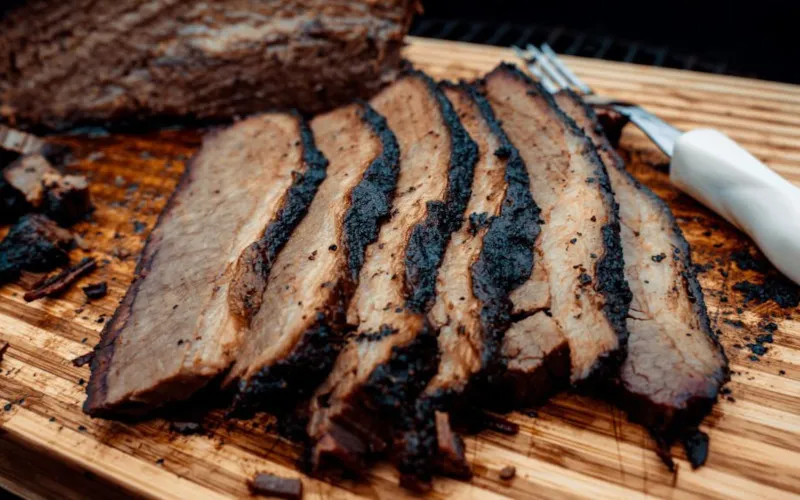A popular way to enhance the flavor of food is to marinate meat in a sauce or liquid before cooking. This method can infuse the dish with more complex and interesting flavors. But what’s the difference between a marinade and a brine? And which one is better for you? Read on to find out!
What is Brine?
Brine is a saltwater solution used to make the meat juicier. Osmosis is the process in which liquid is absorbed into the meat, making it juicier. However, this method’s downside is that the meat’s natural taste can be compromised.
Some chefs prefer not to use it, but it is a great trick to have when you are faced with something that is in danger of drying out in the oven. Brine is also popular because it is relatively easy to make and requires no special equipment.
All you need is a large container to hold the meat, some salt, and enough water to cover the meat. You can add other things to the brine, such as spices or sugar, but the salt is what does all the work. Brining is an effective way to ensure that your meat will be juicy and flavorful.
What is Marinade?
Marinating is the process of soaking food in a flavored liquid before cooking. The origins of marinating can be traced back to the Ancient Romans, who used wine and vinegar to tenderize tough cuts of meat.
Today, marinades are often used to add flavor and moisture to chicken, fish, and beef.
In addition to acidic liquids like vinegar and lemon juice, marinades can also contain oils, herbs, and spices.
When choosing a marinade, selecting one that compliments the flavors of the food you are preparing is important. For example, a sweet marinade would pair well with fruit, while a savory marinade would be ideal for meats. Marinating is a quick and easy way to add flavor to your favorite dishes.
Just remember to refrigerate your food while it is soaking in the marinade, and don’t forget to give it plenty of time to absorb all those delicious flavors!
Related: Best Woods For Smoking Chicken
Frequently Asked Questions
Does Brining Make Meat Salty?
No, brining is often used to add flavor to meat, but it has very little to do with taste. Instead, the salt in a brine solution helps to break down the meat’s muscle fibers, making it more tender.
The strength of the brine solution will determine how much tenderizing occurs, but it will not make the meat salty. Most of the salt in a brine solution will be absorbed by the meat during the brining process.
As a result, the finished product will be much less salty than if treated with a saltwater solution. In addition to tenderizing meat, brining can help keep it moist during cooking.
For this reason, it is often used for poultry and fish, which are prone to drying out. So, while brining may not add much flavor to meat, it can still be a valuable tool for those who want to produce tender, juicy results.
Why Do You Brine Chicken?
Chicken is often brined before cooking to keep it moist and juicy. The process is relatively simple: chicken is placed in a salt-water solution for several hours, then cooked as usual.
The result is flavorful and moist chicken with evenly cooked flesh. In addition to the obvious benefits of flavor and texture, brining also helps to keep chicken from drying out during cooking.
So, if you’re looking for the juiciest, most flavorful chicken possible, brine is the way to go.
How Long Should You Brine Chicken?
When it comes to brining the chicken, the general rule of thumb is that the longer, the better. This is because the longer the chicken sits in the brine, the more time it takes to absorb all the flavors and ingredients.
However, there are a few things to remember when deciding how long to brine chicken. First, it is important to consider the thickness of the meat. For example, a whole chicken will need more time to absorb the flavors than a thin chicken breast cut.
Second, it is also important to consider what type of brine you use. Classic wet can be left on for a minimum of 12 hours and up to 2 days, while dry brines can be as short as a few hours but ideally at least 12 hours and up to 3 days.
Considering all of these factors, you can ensure that your chicken is perfectly seasoned and juicy every time.
A Brine Recipe
Ingredients:
- 1-gallon water
- 1 cup salt
- 1/2 cup sugar
- 1/2 onion, chopped
- 1/2 green bell pepper, chopped
- 2 cloves garlic, minced
- 1 teaspoon black pepper
- 1 (4-pound) chicken or pork roast
Instructions:
- In a large pot, combine the water, salt, sugar, onion, bell pepper, garlic, and black pepper. Bring to a boil and cook for 2 minutes. Remove from heat and let cool.
- Pour the brine solution into a large container or resealable bag. Add the chicken or pork roast and refrigerate for at least 4 hours or overnight.
- Remove the meat from the brine solution and discard the vegetables. Rinse the meat with cold water and pat dry.
- Cook the meat according to your desired method. Enjoy!
Conclusion
Brine and marinade are both effective ways to flavor and tenderize meat. However, they each have their advantages and disadvantages.
Brine is a great way to keep meat from drying out, but it can dilute the natural taste of the meat. Marinade is an easy way to add flavor to your dishes, but you must be careful not to overcook the meat.
So, which one is better? Ultimately, it depends on what you prefer. Test out both ways and see which works better for you!





